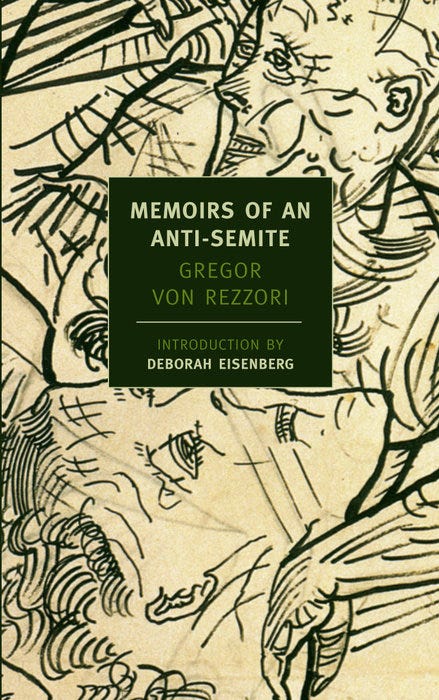One of the earliest pieces of advice we are given as young readers is; “Don’t judge a book by its cover”. It a lesson meant for a much wider application than just books, even if many of us find publishing artists to be a good judge of character. But in an age of heightened sensibility, we may apply a more inclusive version of this advice to Gregor von Rezzori’s Memoirs of an Anti-Semite: “Don’t judge a book by its title”.
In what is one of the best written introductions I have ever read to a novel, which bears re-reading once you have turned the last page, Deborah Eisenberg sums up the dilemma of the title:
‘The complexities of the book’s title alone, the tangled and ambiguous colourations — brutal, nostalgic, formal, comedic, goading, confessional — put one off-balance and on guard before one even reaches the subtitle: A Novel in Five Stories, itself arrestingly equivocal.’
For who would want to be seen reading such a book? Memoirs of an Anti-Semite is certainly not the kind of novel you can snatch a few pages of on during your morning commute or read quietly in a coffee shop. And yet, if you were to be so bold, you would feel misjudged by those who would, quite understandably, presume the reader’s entente with such a provocative name.
As this is a complex book which defies a full characterisation in the ugly admission of its title. The narrator's anti-semitism is peppered over his narratives, often in such a way that seems inconsequential to him and his story; ever present and treated with a coolness that seems entirely unaware of the infamous years that lie ahead. Given that this book was written after the Holocaust, it is a remarkable literary achievement to be able to convey the individual perspectives which led to the horrors of Auschwitz, which von Rezzori tells with a frankness that is unsettling to the modern reader.
And yet the narrator is not a Nazi. He may be anti-semitic, he may sympathise with the Nazis on a certain level, but he is also deeply interested in his Jewish friends and lovers, and their culture. He vacillates in a double bind, wrestling between his humanity and a misplaced sense of racial loyalty; unable or unwilling to break free from the prejudice that is integral to his identity and the superiority he believes this confers upon him.
What emerges from the five narratives is a set of rich psychological portraits that we perhaps recognise, with growing discomfort, as being deeply human, as von Rezzori holds a mirror up to the reader. We consider the characters we meet, many of whom are likeable, with redeeming qualities alongside their anti-semitism, leaving us to consider how history would judge us if we were to write such an honest memoir, fictional though this may be. As Aleksandr Solzhenitsyn famously wrote in The Gulag Archipelago a few years after Memoirs was published:
‘The line separating good and evil passes not through states, nor between classes, nor between political parties either – but right through every human heart… even within hearts overwhelmed by evil, one small bridgehead of good is retained. And even in the best of all hearts, there remains…an uprooted small corner of evil.’
For when we look back at these dark points in history, where humanity seems divided between those either possessed by a kind of mass psychosis or those too frightened to speak truth to evil and power, the temptation is to consider ourselves as outside this division altogether. Surely we would not have succumbed to the evil — we would have been the moral outliers that history vindicates; the Oskar Schindlers or Aleksandr Solzhenitsyns?
But the true lesson is a much darker one. The overwhelming majority, including you, me and everyone we collectively know, would almost certainly have either been those swept up in the mass psychosis, or would have watched on in silent complicity. That is if we were lucky enough to be among either of their number. For, darker still, the author suggests that; ‘the only dignity to be maintained in our time is the dignity of being among the victims’. Von Rezzori and his thinly veiled narrators become increasingly aware of these uncomfortable truths, coming closest to a moral clarity in the pithily titled final story, ‘Pravda’.
Von Rezzori was clearly a writer of a very high calibre, observing a time and a place where the old world was unwittingly on the edge of the new one that would replace it. With the benefit of knowing how his stories played out past their final pages, he provides insight and perceptive depth without playing cheap tricks. There is an intelligence to the prose that shines through and a freshness that makes for a charming read. He does however also have the ability to change pace mid-sentence and delve with authority into love, honour, truth and the humanity that transcends ideology, which are given greater weight by Von Rezzori’s fluid style. In Memoirs, he opens a window on a lost world, conveyed with beauty and balance, such as in the following description of an autumn evening over Bucharest:
‘The sun had just set. I recognised my lavender-blue sky, paler now, colder, less sentimental. It had been late summer when I lived in the neighbourhood. Now it was late autumn. Golden leaves fluttered down from the trees along the Boulevard Bratianu. Miss Alvaro trembled slightly. And for a few moments we both stood there looking out, breathing deeply, rather like divers, I thought, before braving the deep; but then the city below us had much in common with the mausoleum behind us, much the same mixture of modern supertransience and flea-market curiosities. For all its Art Nouveau villas and futuristic glass-and-concrete buildings, Bucharest was as Oriental as Smyrna. The Occident, with its many-splendored towered citadels, was far away, there where the sun, dipping in, blood red, from the swamps and steppes and scrawny settlements of the east, would now only be prewarming the slate and copper roofs before melting them with its farewell blaze.’
Writing and metaphor rarely come much finer than that.






Bears not bares. And thanks for this excellent essay about a book I was ignorant of.